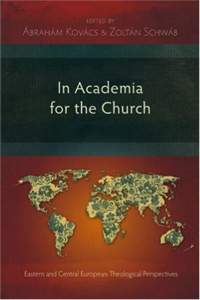4th December, 2015
Ábrahám Kovács & Zoltán Schwáb (eds)
In Academia for the Church: Eastern and Central European Theological Perspectives
Langham Partnership, Carlisle, Cumbria, 2014
ISBN-13: 978-1-78368-946-0
 |
|
"The contributors bring a high view of theological education and Christian tertiary education, and underline the importance of connecting their academic and teaching work with the mission of the people of God in local churches and society." |
Theology faculty bridge the academic and ecclesial worlds. This brings pressure of expectations – to both perform academically (with excellent teaching and high quality publications), and to serve the churches (staying relevant and broadly networked).
Churches are both a recruiting ground for new students and the destination of many graduates, so it is an important reminder to serve the church; yet part of the gift of theological education is to bring breadth and depth of theological resourcing to future leaders, so the academic grounding of faculty is equally essential.
Ábrahám Kovács and Zoltán Scwáb as co-editors have collated 10 contributions related to this theme from academics in Eastern and Central European contexts, drawing on their reflections at the Second Langham Europe conference in Hungary in 2013.
They offer reflections on Biblical studies (Tamás Czövek on the legacy of Johann Phillipp Gabler and Ksenija Magda on Rudolf Bultmann) and the relevance for contemporary theological education. I especially appreciate Magda’s suggestion that the academy needs to welcome and critique the insights and challenge of new academic developments (such as historical criticism), but not necessarily present all new academic discourse to the churches.
Four writers suggest engagement that has potential to enhance theological education. Dóra Bernhardt appeals for greater attention to postmodernism. She urges helping students move beyond seeking knowledge to understanding, particularly through the use of spirituality, the arts, spiritual practices and intercultural theology. These are useful suggestions for new teaching units, but also integrating these areas into other units. For example, it urges me to ask to what extent does my teaching engage intercultural theological insights from non-western writers?
András Lovas’ chapter on missional leadership reflects on his development and teaching of units that help leaders move churches form maintenance and pragmatism to missional leadership. Features of Lovas’ teaching included reflecting on Newbigin-inspired Gospel, church and context; field visits and case studies; and integrating academic study with personal spiritual reflection on the implications. This is an excellent chapter, modelling moving beyond theory and ideas about teaching to reflection on Lovas’ practice.
István Pásztori-Kupán’s treatment of moral responsibility is an appeal for greater focus on theological ethics. He urges being attentive to what we can learn from and challenge in science, global economics and ecology, including challenging the all too common scientific question “why should we not do this?”
Tamás Béres explores public theology and its place in the curriculum, including exploring implications for practice. The key question Béres left me asking was what does it really mean to seek the city’s welfare before the interests of church?
The final four chapters explore theology in university contexts, and the role of Christianity broadly in higher education. Tibor Fabiny writes from his Lutheran Hungarian post-Communist context, and describes some of his innovations teaching before the fall of the Iron Curtain including teaching the Bible as part of the “Intellectual History of English Literature”.
Corneiliu Constantineanu writes as a Pentecostal in Romania and argues for the integration of faith and learning in all fields of study, for “energized action and praxis-oriented theory”,, and bringing a narrative of hope to society.
Corneliu C Simut in Romania and Parush R Parushev in Prague are both Baptist scholars. Simut seeks to reclaim theology as devotional, open and academic; leaving aside ecclesiastical confessionalism on the one hand, but also the humanistic influence of liberalism. Parushev suggests it is worth doing the hard work to prioritise and integrate both preparation for church service and academic theological education, but the primary focus needs to begin in the church, albeit contextualising theology in conversation with the academy.
The contributors bring a high view of theological education and Christian tertiary education, and underline the importance of connecting their academic and teaching work with the mission of the people of God in local churches and society. This is a valuable volume on theological education in Europe, but insightful for those interested in these topics working anywhere.
This review was originally submitted to be published in Journal of Adult Theological Education (submitted 5 July 2015)
Follow this link to buy this book – In Academia for the Church.
FOR MORE ON BOOKS, visit our books page here…
FOR SIGHT’S BOOKSHOP, visit here…






